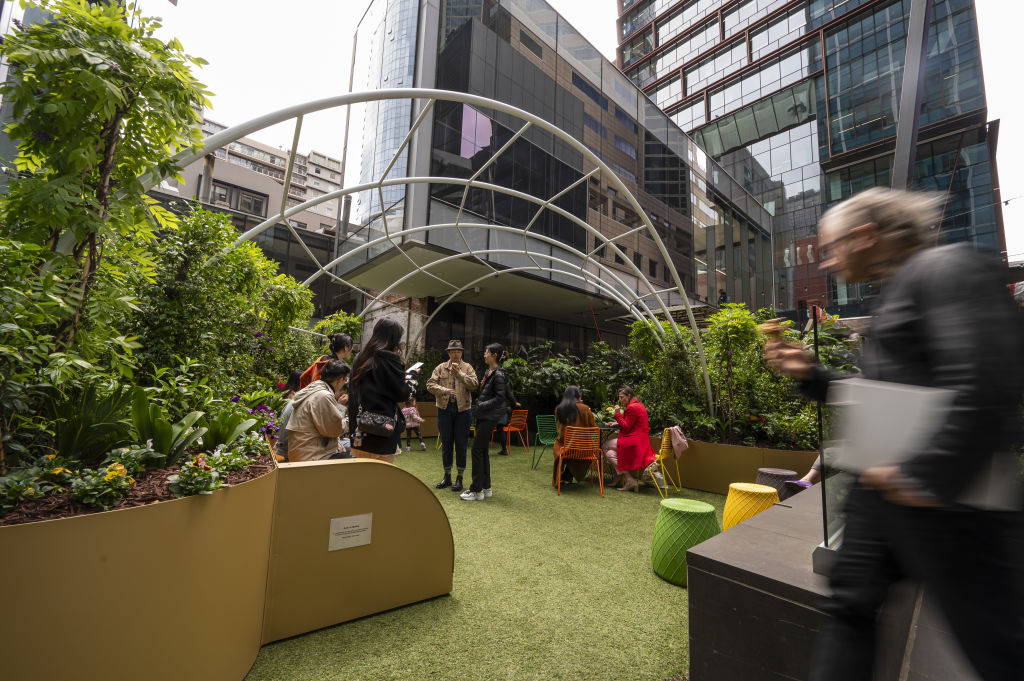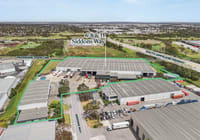
The secret to getting workers back into the office may be ... chefs
Fine dining – not food courts, fancy end-of-trip facilities or daycare centres – can be the saviours of the country’s beleaguered office towers and city centres struggling to return to their pre-COVID-19 bustle, successful restaurateur Chris Lucas says.
Mr Lucas, who operates Melbourne establishments Chin Chin and Kisume on the city’s popular Flinders Lane dining strip, has already witnessed the impact high-end restaurants can have on two of the city’s most important office buildings, 80 Collins Streetand 101 Collins Street.
Last year, he opened steakhouse Grill Americano at the back of 101 Collins Street (replacing a number of shops on Flinders Lane), while at 80 Collins Street, Mr Lucas was instrumental in the design of an upmarket restaurant precinct that includes two of his eateries, modern culinary establishment Society and Japanese charcoal grill restaurant Yakimono.
Not only have these restaurants been successful (on the day The Australian Financial Review visited Grill Americano, Melbourne Cup-winning jockey Mark Zahra had booked a table for a celebratory lunch) but, according to Mr Lucas, they have been instrumental in lifting occupancy rates and rents in the towers above them.
80 Collins Street is owned by Dexus and the Dexus Wholesale Property Fund, while 101 Collins Street is owned by the Commonwealth Superannuation Corporation and managed by global fund manager AXA Investment Management.
Mr Lucas, a vocal critic of Melbourne’s numerous lockdowns during the pandemic, said while the city’s day trade was still a long way from returning to its pre-COVID-19 days and fewer people are coming into the city between Monday and Friday, those who did were having longer lunches and using his restaurants to socialise and network.
They created a reason for people to come into the office more often, he said.
“Food and beverage spend is up and visitor numbers to our restaurants are stronger,” Mr Lucas said. “People are using these places differently.”
Hospitality had a broader role to play in reviving and reshaping CBDs and the restaurateur is now working closely with the City of Melbourne on strategies including repurposing B-Grade office buildings.
“I’m a firm believer that while our CBD may look and feel different in the post-COVID era, from an office workplace point of view, the city will always be a centre for events, entertainment and dining,” he said.
The challenge for office tower owners is great. National CBD office vacancy rates are at near 30-year highs of nearly 13 per cent, according to the Property Council’s benchmark office market report.
That’s also affecting their value. New MSCI figures The Australian Financial Review published this week showed the wholesale unlisted office sector was now also being hit by falling values, with the $7.2 billion Mirvac Wholesale Office Fund suffering a 14.5 per cent decline in total return.
The debate over whether work-from-home here to stay missed the point as many landlords themselves lacked the knowledge or experience to rely on great design outcomes and relied too heavily on consultants, Mr Lucas said.
“The debate should be: what is the new office environment, what does it offer, and how do you add value?” he said.
”The best results are achieved by working with industry leaders like us who understand design and strive for world-class commercial outcomes.”
Sydney set to follow
In Sydney, Dexus, the country’s biggest office landlord, has turned to steakhouse king Bradley Michael to create a destination dining experience in one of the city’s premier office towers, 1 Bligh Street.
“Dexus approached us to take over a big space at the bottom of the tower where government offices used to be,” said Mr Michael, the founder of Seagrass Hospitality, which operates over 40 restaurants in Australia and the Middle East.

He is working on plans to open another of his popular Meat & Wine Co steakhouses by the end of April or early May, with a distinctly African theme.
“It will have a life-size statue of a rhino in it and the look and feel of an African safari lodge,” he said.
In the wake of COVID-19 restrictions, big office landlords werekeen to negotiate fair leasing dealsfor both parties because they recognised the positive impact restaurants could have on the success of their towers, Mr Michael said.
“The bigger landlords with deeper pockets are looking to invest in good operators who will be there a long time,” he said.
“They are happy to give nice [fitout] contributions. They are doing good deals on rentals with longer leases. That’s what I am seeing.”
Last month, Seagrass opened a 6HEAD fine dining restaurant at Brookfield’s One The Esplanade office development – the new headquarters of Chevron – at Perth’s Elizabeth Quay waterfront precinct.
Brookfield Properties president Danny Poljak said working with groups such as Seagrass Hospitality enabled the real estate giant to curate places for where people want to be.
“There is much to be gained from our mutual success,” Mr Poljak said.
“Having great food and beverage venues within our assets not only creates vibrancy in our CBDs, but it also, importantly, creates great experiences for our office tenants and helps us maintain high standards of quality in our real estate portfolio.”
Back in Melbourne, Amanda Pieriboni, head of transactions & developments at Dexus, says the high-end hospitality element created by Lucas Group at 80 Collins had elevated the offering for customers looking to attract and retain talent.
Office tenants were looking for more than just a workplace, Ms Pieriboni said.
“Office workers value being close to exciting entertainment options as well as bars and restaurants, which make them critical ingredients for a successful office tower,” she said.
Chris Willey, head of asset management and ESG at AXA IM, said fine dining was “absolutely” part of what is needed to encourage employees back to the office rather than mandating it.
High-end dining, along with other amenities such as end-of-trip facilities, a health and wellness studio offering yoga, boxing and golf conditioning classes, as well as treatments including massages kept the 101 Collins occupied, Mr Willey said.
”We have no trouble with leasing space,” he said.
“Occupiers want to be somewhere where rather than having to force staff back into the office, they want to come into the office.”
Clients are still tapping consultants to secure what they want. MA Financial hired Hana Hakim, founder of The Stella Collective, to design their new office, complete with an inhouse restaurant and resident chef.
“Office buildings are going through a hard time, so it’s important there is this feeling of hospitality which gives people a warm welcome,” Ms Hakim said.
Clients were looking for offices that gave “that powerhouse feeling of walking into a sexy hotel” to get people back in corporate attire, she said.
Her firm was designing office kitchens that she said could be found in a publication such as Vogue Living.
“So it’s a lovely gathering space, not somewhere where there are old protein shakes and Tupperware everywhere,” Ms Hakim said.
Hotels embrace the dining game
Office tower landlords aren’t the only ones to embrace fine dining as a way to bring people back to the city.
The fleet of new luxury hotels that has opened in CBDs across the country in the last two years as part of a wave of post-COVID-19 development has focused heavily on food and beverage offerings, including housing award-winning restaurants open to the public and ditching costly buffets.
At the forefront of this is accommodation giant Marriott, which operates contemporary Japanese restaurant Warabi at the W Melbourne (which opened in 2021), Warabi won Two Hats in the 2023 and 2024 Good Food Guide awards as well as Best Deluxe Restaurant at the Victoria Accommodation Awards for Excellence 2023.
High up in the clouds at the top of the dazzling Ritz-Carlton Melbourne (which opened in March), Atria helmed by executive chef, Michael Greenlaw, has already garnered a Chef’s Hat for its modern Australian cuisine while in Hobart, the Tasman Luxury Collection Hotel has a hatted restaurant in Italian venue Peppina.
Overseeing all of these restaurants and hotels (including the new W Sydney) is Krister Svensson, multi property vice president of luxury at Marriott.
“Restaurants are playing a big role in bringing people back to the cities,” he told the Financial Review.
“The majority of people who come into our hotel restaurants are not staying at the hotel,” Mr Svensson said.

In the case of the W Melbourne, the luxury hotel is part of mixed-use skyscraper Collins Arch, which is home to about 3000 office workers and a tenant base that includes a number of law firms and financial institutions.
“We get a lot of corporate bookings for lunches and for evening dinners,” he said.
This activation of precincts through fine dining, events and entertainment was key to creating successful workplaces of the future, Mr Lucas said.
This required a genuine partnership between landlords, office tenants and hospitality operators. It was happening around the world but many asset managers in Australia were still lagging, he said.
”Prominent chefs are doing joint ventures with landlords in London and New York and getting involved in the real estate side of things. This includes developing buildings around restaurant brands,” he said.
”Having a large foyer with a cafe and some retail does not work any more”.











